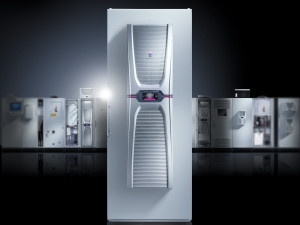Herborn/Hanover, Germany, 15 May 2017

Transmission of data to the cloud capturing, transmitting and processing data lies at the heart of the fourth industrial revolution. Consequently, cutting-edge connectivity is a must for equipment in factories and similar environments - for example to enable predictive maintenance. At Hannover Messe 2017, Rittal is highlighting the communication capabilities of its new cooling units and chillers. And by presenting these in conjunction with Siemens MindSphere and IBM Watson IOT, the enterprise offers insight into tomorrow's Industry 4.0 world.
Rittal's new Blue e+ cooling units and chillers consume an average of 70% less power than their conventional counterparts. What's more, they raise the bar in M2M communication. Specifically, they can transmit key data to a smartphone quickly and simply via a NFC (near field communication) connection. And RiDiag III parameterisation and diagnostics software uses a USB interface or a network to support efficient system operation, deliver rapid support for maintenance and repairs, and enable in-depth diagnostics.
The new communications module (Com Modul) also allows the cooling units and chillers to communicate with any higher-level system via OPC UA, PROFINET, SNMP, Modbus RTU and CAN Master - enabling predictive maintenance, data analytics and more.
Rittal is presenting two examples of these products in use at Hannover Messe 2017 (the industrial trade fair in Hanover). These highlight the potential of the Blue e+ range's communication capabilities.
Use case: Siemens MindSphere
The first use case shows how Rittal's units interact with Siemens MindSphere. This cloud-based, open IOT (Internet of things) operating system enables customers to develop their own Industry 4.0 applications. The platform is scalable, and can capture and analyse huge volumes of data - paving the way for smart-factory processes in energy data management and resource optimization, for example. Additionally, it harnesses analytics to predict when repairs and maintenance are required. This cuts costs and raises system uptime in comparison to work performed at predefined intervals. The solution also calculates the shortest routes for service engineers to take for these tasks - which can be particularly advantageous at facilities with a large number of machines. Plus, because up-to-the-minute data on each unit is available on the IOT platform, staff know what replacement parts they will require for the job in hand, eliminating the need for multiple trips.
Use case: IBM Watson IOT
The second use case examines how Rittal products interoperate with cloud-based data analytics system IBM Watson IOT. Watson's architecture is designed to rapidly process information, and employs machine learning algorithms to analyse growing data volumes with increasing precision - with the aim of finding better answers to a variety of challenges. A machine at Rittal's production plant in Rittershausen, Germany, is a prime example, demonstrating how this information is used to improve efficiency. These types of data analytics applications streamline maintenance and cut downtime - in other words, customers benefit from lower costs and higher machine availability. The solution's new technologies also open up new business opportunities, e.g. within the scope of smart maintenance contracts.
By means of these two examples, Rittal provides insight into tomorrow's Industry 4.0 world, and the new business models these will enable. And all this potential stems from the seamless transmission of data from sensors inside the cooling units and chillers to the cloud.
Share